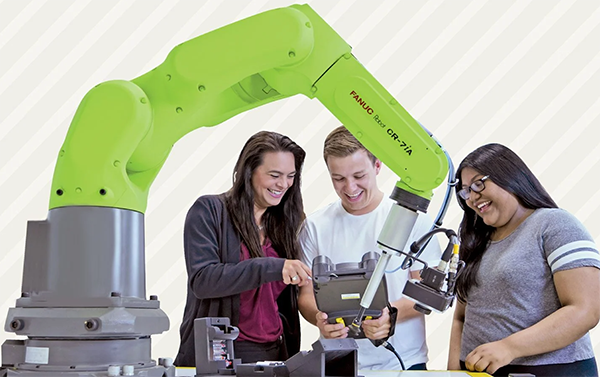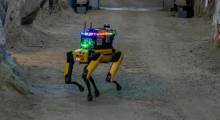The drive for industries to automate is chaning how people and machines work together. The number of robots installed in factories more than doubled in 10 years, reaching about 3 million units worldwide in 2020, according to the International Federation of Robotics.
The IFR last week said it has researched how robotics training can shape workforce education and enhance skills development, both now and in the future.
“Automating dull, dirty, and dangerous tasks is changing job profiles of factory workers for the better,” said Milton Guerry, president of the IFR. “Academies run by robot manufacturers play a key role in making this transition possible. Employers send thousands of workers to robotics training every year.”
Manufacturers lead robotics training efforts
Robot manufacturers such as ABB, FANUC, and KUKA all register between 10,000 and 30,000 participants in their robot classes across more than 30 countries every year, said the IFR. The training programs range from basic programming for the first-time user to complex workshops.
“The automotive industry traditionally plays a leading role in upskilling workers for the use of robotics,” said Gerhard Müller, vice president for global customer services at KUKA. “Volkswagen, for example, decided to host one of our KUKA colleges directly at their headquarters factory in Wolfsburg, Germany.”
“We start with basic training for people who have never used a robot before,” he added. “For professionals, we offer about 70 different modules ranging from basic operation and programming to complex commissioning of entire robot systems.”
“Training programs set up by international robot manufacturers provide key skills for the industrial workplace of the future,” claimed Alexander Bongart, head of the FANUC Academy Germany. “What participants learn in our headquarters school near Mount Fuji in Japan is what they also get in our training schools established in the U.S., Europe, or China.”
“Robotic certificates for workers are valid around the globe and qualify for fantastic new career opportunities,” Bongart said. “This is not limited to the classic adopters of robotic and automation like the car industry but also true for small and midsized companies from a wide range of branches.”
As more industries move toward automation than ever before, robotics training is also becoming part of public education in the U.S., Europe, and Asia, noted the IFR.
“In China for example, ABB Robotics’ cooperation with vocational schools dates back to 12 years ago,” said Arno Strotgen, group senior vice president and head of customer service and digital platform of ABB's Robotics & Discrete Automation business area. “Today, 700 vocational schools are part of the project.”
“We use industrial robots for our trainings and provide 1,000 new robots every year, only to China,” he continued. “At the same time, simulation software and augmented reality open up new ways of teaching. The days when everyone needed to be an engineer to handle a robot are definitely over.”
Policy updates, SME investment needed
“Governments face the need to update their education policies,” said Guerry. “The qualification to program and use a robot is an essential skill required of workers before they even enter a job on the shop floor.”
“To enable the transition, robot manufacturers are the best possible partners, providing the right skills necessary to work with intelligent automation systems,” Guerry said. “The International Federation of Robotics invites public authorities to team up with the experts and to use their know-how to deliver education for the workplace of the future.”
In addition to a wage gap and labor shortages, employers are dealing with a skills gap.
“We haven’t trained people in advanced technology positions, like how to operate a robot or program these new machines,” Ben Armstrong, interim executive director of MIT's Industrial Performance Center, told Forbes. “The assumption has been that if you build training programs for technicians in robotics or advanced manufacturing skills, then there will be jobs for those people.”
“But that’s not actually happening, and unless SMEs [small and midsize enterprises] invest in those new technologies, those new jobs won’t come. There are two sides to the equation—one is the training, but the other, and where we think the start should be, is SMEs investing in more advanced equipment and advanced approaches to manufacturing, which will lead to more productive and higher-paying jobs.”
Article topics
Email Sign Up



















